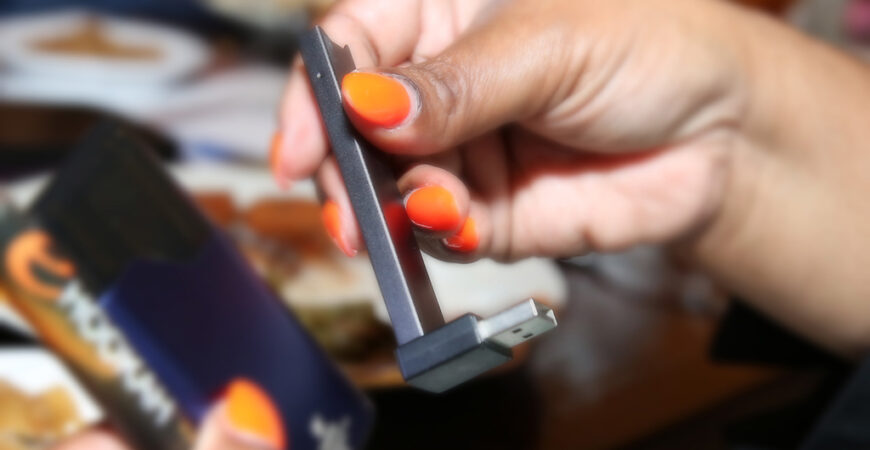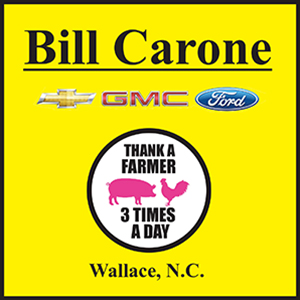WALLACE — Approximately 30 participants, including county and town leadership, gathered for the annual Opioid Town Hall at the Mad Boar Restaurant last week.
“We are trying to get our towns to think about what we can do to help the vaping and opioid crisis and give examples of what other counties are doing,” said Maury Castillo, Duplin County Health Department public health educator, adding that they hope some of those could be implemented locally.
Jamie Murray with the Duplin County Health Department Opioid Response Team opened the floor with an update on the Opioid Settlement Fund Distribution.
“We have been allocated $4,457,908,” said Murray. “We have already received $1,289,620.98. That’s almost 29% of our allocation.”
Murray spoke about some of the strategies that are being implemented in Duplin County, among them the distribution of free naloxone and medication safe lock boxes. Also, the Too Good for Drugs curriculum, which has been added for Duplin County Schools, starting with first, third, fifth, seventh and ninth graders. “When we did the pilot program, the kids loved it. They were very engaged.”
Addiction treatment for inmates is another strategy that the Opioid Response Team will be implementing at the Duplin County Jail. It will include medication-assisted treatment and medication coverage.
Guest speaker Ernest Watts with Southeastern North Carolina Tobacco League was next on the lineup.
“One-third of your students have used a vape; 32% of them are using a vaping product at the current time,” said Watts, adding that 15% of them are in middle school and officals are seeing it in elementary school children as well.
“We’re seeing a high percentage of those using a controlled substance; 13.4% of your entire student body, high school and junior, are using a controlled substance, and that’s usually opioid or THC,” said Watts.
“Vapes don’t have the traditional smoke that you see with cigarettes. … It’s invisible, but the gas is still emitted. For those people around vapes, they’re exposed to nicotine, small pieces of metal, micro-fractured particles of aluminum and tin, some of the carcinogens that we see in tobacco. Remember there are chemicals we find in tobacco leaves, which are transmitted to the vape fluid, and that’s insecticides, because these are plants,” he said, adding that the propylene glycol used for flavoring on vapes damages the lining of the lungs.
Watts spoke about the towns’ ability to use the unified development ordinance as a tool to restrict the proliferation of vape shops in certain areas which make them accessible to children. While the goal is not to stop legitimate merchants, the concern is that many of those vape shops selling to minors are in strip malls and near schools.
“Unfortunately, we find not only are they selling vapes and nicotine, but they’re also selling forms of THC and kratom. Kratom is hallucinogenic. It comes from a plant in the Philippines.
“And right now in North Carolina, anyone can purchase it and anyone can take it anywhere they want. It does not fall under smoke-free, tobacco-free laws. If a first grader went into a vape shop and purchased kratom, you’re not breaking the law. If a third grader took kratom on school campus, you’re not breaking the law. They can do whatever they want with it,” said Watts, adding that several laws have been brought before the legislature. “House Bill 391 was brought this last time. It got tied up in committee. They did pass a law that they have to have a list of every vape product that’s produced. And it’s going to be the secretary of state’s office in 2027.”
Watts emphasized there is no law regulating kratom, Delta 8 and Delta 9.
“You’re going against a well-endowed manufacturer who has better lawyers than we have and has much more influence. … When this bill came through, I could not call my senator or my representative and say, ‘We need this,’ because as a state employee, I’m bound against that. Yet the companies could spend millions of dollars toward the legislature to prevent it.”
Watts spoke about what other counties are doing to combat the opioid epidemic. He explained a county can’t ban sales, but they can restrict where vape shops are located.
“In 2023, Wake County passed a unified development ordinance — a UDO amendment. Wake prevented tobacco hemp retailers from establishing in the unincorporated areas of Wake County 1,000 feet from schools, parks, greenways and up 1,000 feet from other hemp retailers and residences. They did this through land use.”
Watts shared that an age check revealed that 23 out of 61 vape retailers in Jacksonville were selling to underage kids.
“I don’t like to compare counties because every county is different, but if they do it in a neighboring county, it’s going on here too,” said Watts. “They are preying on kids and they’re getting them addicted. … And not only that, but it also leads to other drugs such as opioids being used. Again, we don’t want to appear anti-business. We just don’t want them that close to our kids, parkways, our churches and our residential areas. As of Aug. 26, middle schools and high schools now have vape detectors. … Onslow is one of the three counties with the highest opioid rates in the state of North Carolina. You’re a different county, but you’re facing the same problems.
“I have an attorney, who is pro bono, will do any work to get this done for any municipality.”
The town hall concluded with a story about Solomon, a 15-year-old football player who was casually introduced to vaping, ultimately leading to his death.
Guest speaker Charlene Zorn, Salomon’s stepmom, shared that when they first found out it was vaping that caused his death, Solomon had been dealing with health issues no doctor could figure out. Upon visiting a pediatric pulmonologist and running some tests, the doctor immediately knew.
“She looked at my son and said, ‘So you’ve been vaping, haven’t you?’ … Solomon had popcorn lungs,” said Zorn. “Things just kept getting progressively worse. … This was a kid who would be in the weight room at school every morning, pumping weights with his buddies, you know, standing ready for football. … We’re not talking about a kid who vaped for years. We’re talking about a kid who did sporadically for a year, year and a half. Al (Solomon’s father) caught him with a vape once, took it away from him, had a conversation, never thought anything about it again. … Nowhere would have someone thought that within four days, my son was going to be dead.
“And I tell you it is the most earth-shattering experience I’ve ever been (through). … Nothing is like watching your 15-year-old child die.”
For more information, contact ernest.watts@hth.co.robeson.nc.us.
 Twitter
Twitter Facebook
Facebook Instagram
Instagram






